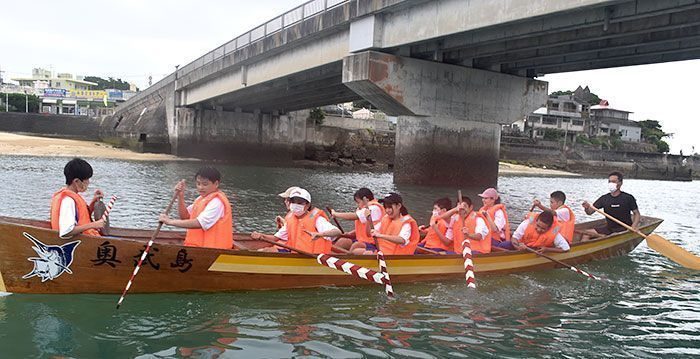
June 29, 2022 Ryukyu Shimpo
By Koei Chibana
On June 17, on Nanjo City’s Ojima Island, about 160 Tamagusuku Junior High School Freshmen climbed into haryusen boats and experienced hari, or dragon boat racing. The students rowed with all their might while learning firsthand the significance of the tradition and their hometown’s history.
On the previous day, Ou Ward Mayor Susumu Nakamoto, 73, visited the school and gave a lecture to the freshmen about the Ojima Island sea-god festival and the dragon boat race.
According to Nakamoto, in the 17th or 18th century, a Tang Dynasty ship drifted ashore on the coast of Ojima Island during a typhoon. It is said that the people of the island risked their own safety to rescue the shipwrecked crew, who returned safely to their country.
In return, the people of the island were later gifted a statue of Kannon, the goddess of mercy, and a set of Buddhist ritual items to protect the Island. Ward Mayor Nakamoto explained that to pray for safe voyages, bountiful catches, and harmony and prosperity among the people of the island, the tradition of starting the dragon boat race at Kannon-do, a temple dedicated to the Kannon statue, has been upheld annually.
Additionally, a May 4, 1912 entry (dated on the lunar calendar) from a diary of seaside activities on Ojima Island mentions a dragon boat race, and Nakamoto speculates the tradition may have started around that time.
On the day of the students’ first hari experience, five freshman classes were divided into eight sets of two teams. The students tried their hand at dragon boat racing in succession. Several youth club members of the fishermen’s union played the key role of steering the boat, while the students sounded handheld gongs and rowed vigorously.
After their one-hour hari experience, the students eagerly voiced their satisfaction. One student commented, “At first, I didn’t have enough power to row but it became easier over time. I had fun with the gongs as well.”
(English translation by T&CT and Monica Shingaki)



